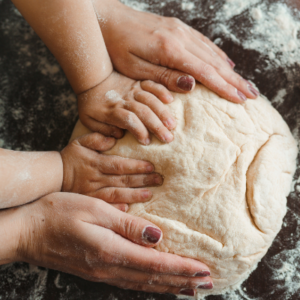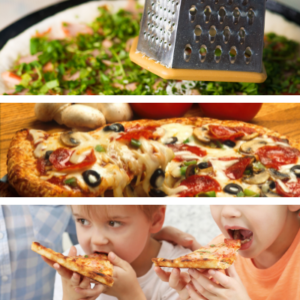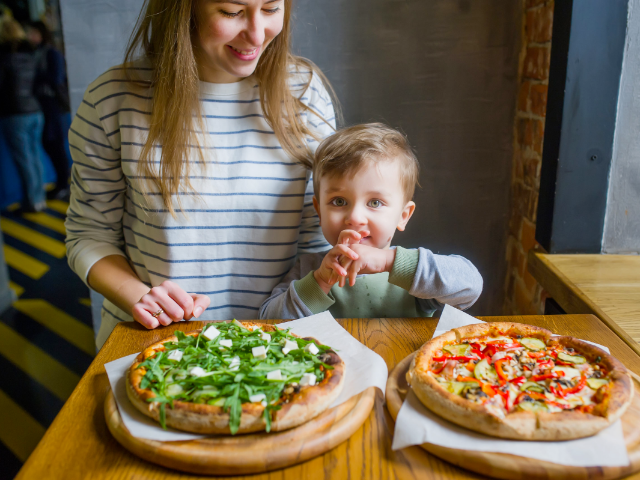Want a pizza recipe to do with your kids? Look no further.
Have you ever had a week that really wore you out, and none of the grownups in the house have the strength for a food battle or to make multiple dishes, but you don’t just want to feed the kids cereal….again? We were having one of those weeks, and we needed a meal everyone would eat (read won’t gag and puke everywhere) and satisfy my kid’s need to be messy in the kitchen.
So our Friday night pizza tradition was born. It was the perfect way to end the week, knowing there wasn’t going to be a food battle, and we would have leftovers through the busy weekend. Homemade pizza is a wonderfully versatile food that you can add anything or nothing, and the cooked-up dough is super tasty. Here is a great recipe that is great for kids of all types, including those with sensitivity to sensory triggers.
The dough is a sensory experience
From a sensory level, bread making and baking of any kind is great to meet sensory needs. Watching the yeast bloom in the warm water and honey is very calming; we use it as a time to do breathing exercises. Also, the smell of yeast isn’t offensive to most sensory-sensitive kiddos.
Little helpers
Depending on your child’s level of dexterity you can let them add the flour. I usually add the flour and other ingredients because my little fox just isn’t there yet. Then we turn out the dough and knead it. This can be a child’s time to shine. Dust your hands and your child’s hands with flour then break off a small piece of dough for your child to play with let them knead their own piece. Don’t worry if they try to eat it since there is no raw egg in the dough it is pretty safe (flour is still raw but for most digestive systems it is not an issue but please use your best judgment for your child) they can roll snakes or practice pinching the dough hard and soft. When you’re done playing, the smaller piece can be kneaded into the larger piece and covered to rise.

Top it off!
When making the pizza, any toppings are fair game. We have used canned pizza sauce, tomato paste, pasta sauce, alfredo sauce, and no sauce. Furthermore, for meat options, cut-up ham, cooked hamburger meat, grilled chicken, sliced hotdogs, sliced firm tofu or meatless sausage, or your more traditional pepperoni can all be used. Cheese can be anything as long as it is shredded. Also, a box grater is an awesome way to get your kids involved in the kitchen. To keep little hands safe, you can wrap the block of cheese with a cloth napkin or kitchen towel. Mozzarella slices can be added as block mozzarella is hard to shred. We like to add Sautéed onions, sliced peppers, chopped pickled artichoke hearts, and olives in our house. Dried oregano and extra garlic (fresh, dried, or garlic scapes) are always added on top of everything.
The best part is everyone gets what they want. My kid loves tomato paste, 2-3 pieces of turkey pepperoni, and Mexican blend cheese with lots of dried oregano on top or fresh basil leaves!
The Friday Night Pizza Recipe
This sensory recipe will provide you with one large pizza or 4 small individual pizzas. For kids who don’t want any unwanted ingredients to touch their food individual pizzas are perfect. This recipe can also be doubled if you are serving more people or want extra leftovers.
Ingredients
- 1 cup warm water (115F)
- 1 package of yeast
- 1 tsp. Honey
- ~2 3/4 cup flour
- 1/2 tsp. salt
- 1 Tbsp. olive oil
- 2-3 Tbsp. cornmeal (optional)
Steps
- Mix warm water, yeast and honey in a large bowl and let it sit for 10-15 min until yeast is all bubbly and yeasty smelling. This is where you can let your child watch the yeast make bubbles.
- Add the flour, salt and olive oil. Mix and knead for 5-10 min add more flour if sticky
- Cover the bowl with plastic wrap and let it rise for 1 hour on the counter or overnight in the refrigerator (if you make it in the morning and leave it in the fridge while you’re at work, it works just as well)
To cook
- set oven at ~ 425 (you may have to adjust this depending on how many toppings you put on we like lots of toppings so cook at 400 for longer – helps everything cook and get the cheese melty)
- Spray a cookie sheet or pizza stone with cooking spray or wipe down with oil
- Sprinkle some cornmeal (optional – creates a crunchy crust on the bottom)
- Spread the dough and add toppings or no toppings. Be creative! Add what you think will taste good.
- Cook in the oven for 18-20 min then turn the pan & put it in for another 5 min. to finish cooking. Keep an eye on individual pizzas since the cook time will vary depending on the size.
- Let rest for ~ 5 min and enjoy!
- Leftover pizza will keep in the refrigerator for up to 4 days
Options
- Add chopped fresh or powdered garlic and/or some Italian herb mix or dried oregano to the dough during step 2. Add a bit less flour to account for seasoning and add more flour as needed when kneading the dough until it’s elastic but not sticky.
- This recipe works great with gluten free flour. More kneading may be needed to get a more smooth texture and it will not be as elastic but the texture and flavor are right on the mark.
- This dough can be cooked as flatbread with no toppings at all and is very tasty.

Great Pizza Reads:
Pizza! An Interactive Recipe Book By Lotta Nieminen
1, 2, 3, The Farm and Me By America’s Test Kitchen Experts




